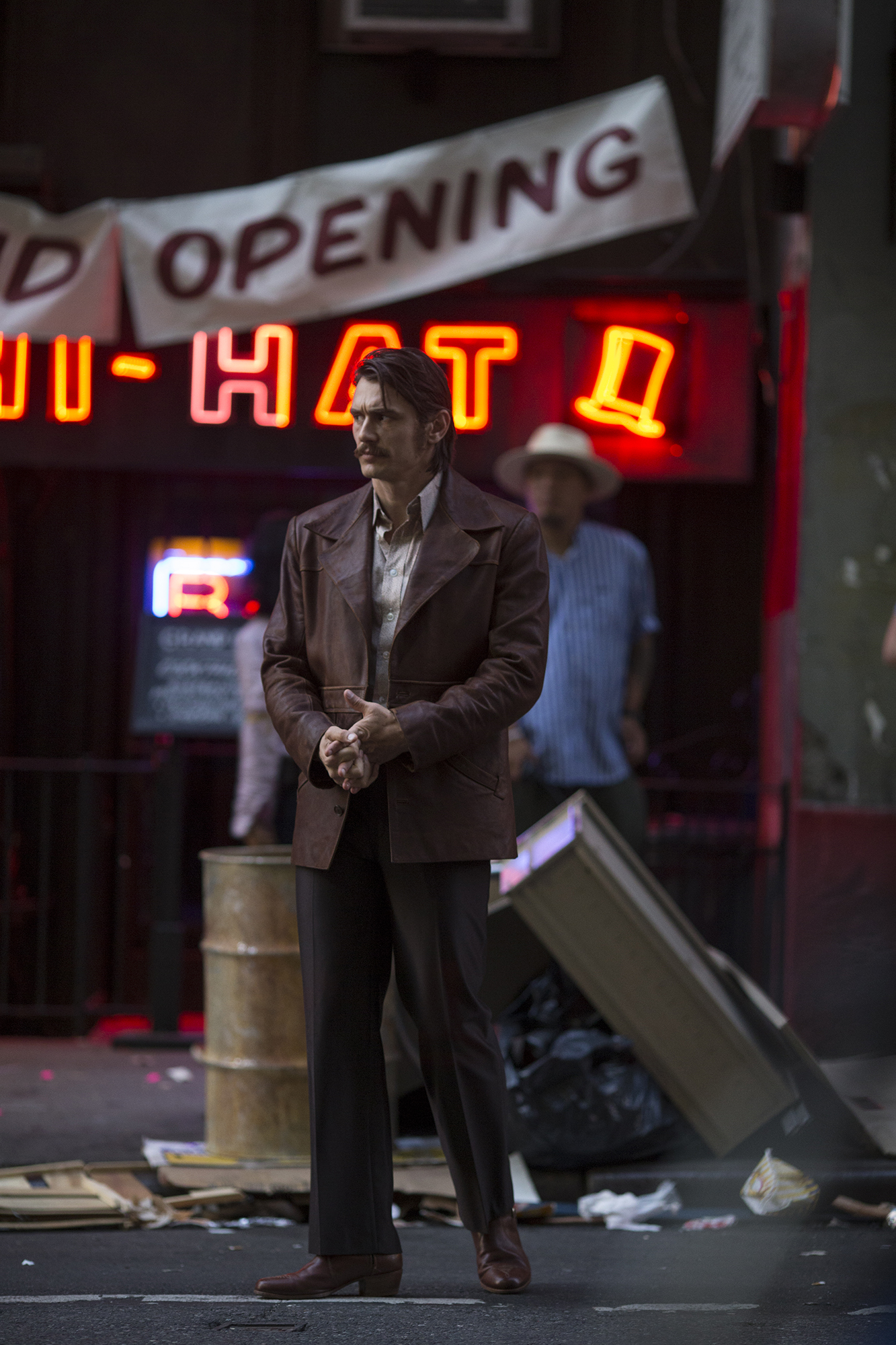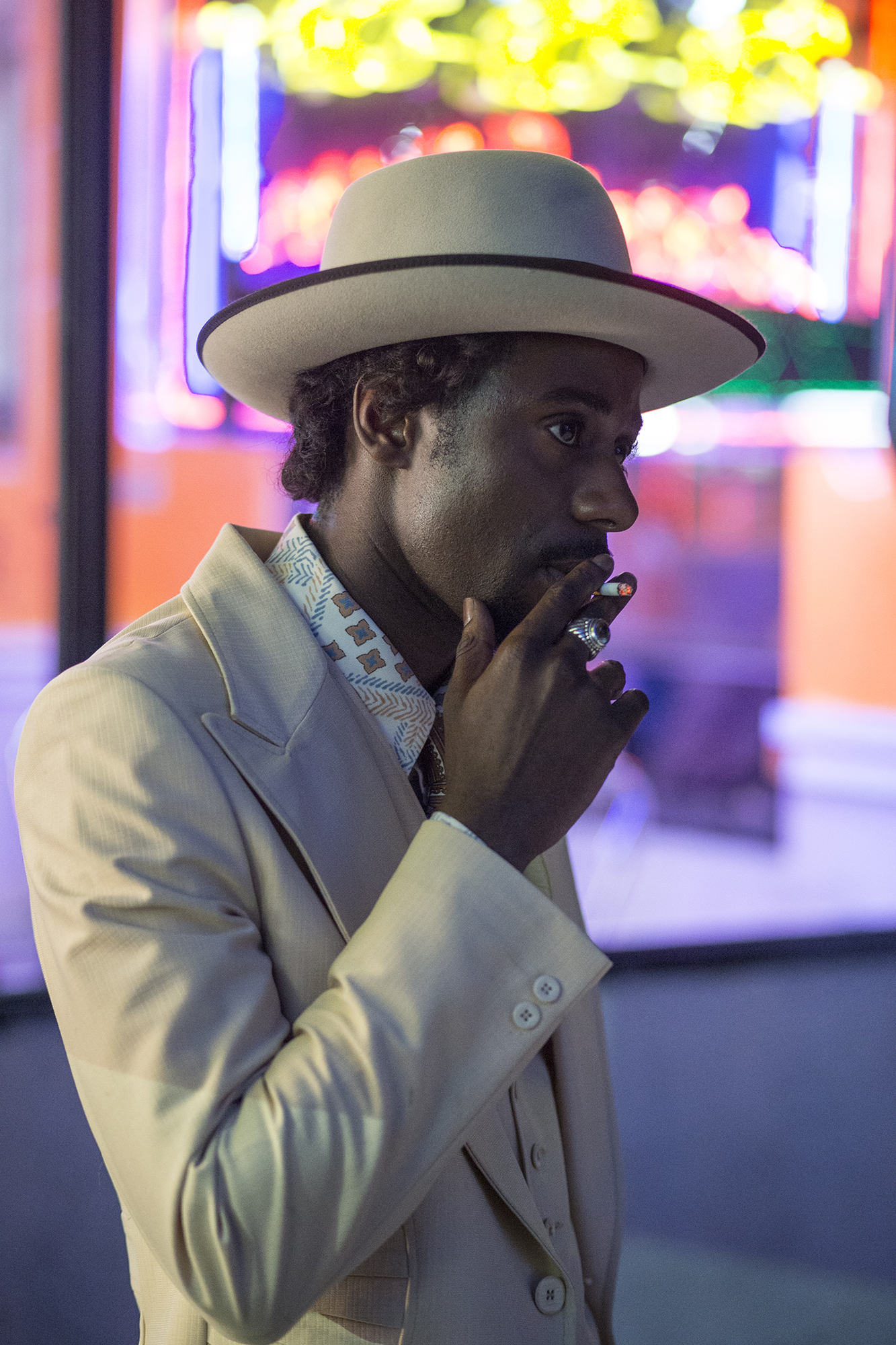Because you can find recaps elsewhere, and because we long for the watercooler talks of '90s yore, two editors, Sam Eichner and Geoff Rynex, will be using this space to have a weekly conversation about HBO's The Deuce, David Simon and George Pelecanos's unflinching portrait of the sex industry in 1970s New York. Obviously, THERE WILL BE SPOILERS. This week's topic is S01E03, The Principle Is All.
Sam Eichner: Maybe I was on the lookout for this stuff more than usual, given that James Franco directed this episode (his first of two), but there were a few moments here that stuck out to me as, if not cinematic, then at least on par artistically with some of those late, great Mad Men episodes. The first was when Darlene returns to Larry in the morning after falling asleep watching a movie with her regular, and she pretty much tells him to get it over with—to hit her or berate her, to teach her a lesson she knows all too well by now. With calculated volatility, Larry doesn't lay a finger on Darlene; instead, he casually drops his glasses on the ground and tells her to pick them up, before getting in the car. In some ways, this demand felt more cruel than physical or verbal abuse: Larry's power over Darlene is so ingrained as to have become completely rote. The gesture belies any autonomy on Darlene's part. It's clear that Larry is her master, she his slave.
Another moment I want to highlight: Candy, standing in her kitchen, smoking a cigarette, listening with blasé resignation to a voicemail from one of her clients, informing her that he'd gotten the clap. The slow zoom on her face as she lets out a world-weary laugh...This was one of few scenes in last night's episode that didn't involve any plot (there was a LOT of plot, almost too much), but it was beautiful, and just as vital. Between this scene and her attempts to fight back tears during her disappointing lunch meeting with Harvey, Gyllenhaal is really making Candy come alive.
I bring these moments up partly because I thought they were great, and partly to contrast them with the most pivotal scene in the episode. Abby walking into Vincent's new bar and walking out again, after finding out the only job available is waitressing in a skimpy outfit, only to walk back in a beat or two later. That was a classic television moment. And it made me smile. Because I knew we were finally "getting the gang together," as evidenced in the final few scenes in the bar, which managed to end an episode rife with cynicism on an uplifting note. What did you think about the first Franco-directed episode? How do you feel about Abby coming to work at the bar?
Geoff Rynex: I'm actually surprised they gave Franco the most plot-heavy episode yet to direct. It seems like an assignment for a more workaday TV director, but he did a good job with it and there's not a lot of scene-chewing, capital-A Acting in this one, which I admire. Speaking of Mad Men, we've got a John Lindsay allusion here. Apparently lawyers for his administration are forging another one of their many alliances with with Mob, bringing on Rudy Pipolo to develop properties in the now-no-go-zone (the Hamsterdam of The Deuce) of Hell's Kitchen. The idea I guess is to clean up Times Square so Lindsay's got a shiny civic achievement to tout during his presidential run by...hustling all the prostitution, corruption and casual stabbings a few blocks west.
Only three episodes in, and I'm already taking Gyllenhaal's performance for granted. She just sinks right into Candy doesn't she? I'd bet all the quarters in all the jukeboxes in all the bars in all of '70s New York City that her Wasserman (could this dude be played by anyone besides David Krumholtz?) lunch meeting won't dissuade her from her porn-magnate future, so I'm not too concerned for her. I find myself more fascinated each week by the obscenity laws and how they make the industry work or not work. When Ruby takes Candy to a packed-house porn performance ($40 a head is the going rate for both porn viewing and an actual transactional roll in the hay), there's not even any film in the can. There can't be, lest the director get busted. They can do the whole thing in public though, because, art. Apparently it’s just the idea of being in a place where sex is being filmed that gets people off. Human sexuality really is infinitely complex isn’t it? A reader this week pointed out that this opening season takes place just a couple years before the landmark Supreme Court case Miller v. California, which altered the legal definition of obscenity and brought us the famous Justice Potter Stewart "but I know it when I see it," quip. I haven't dug in on that case yet, but I promise to before next episode.
I'm still finding it hard to care about Abby. She's by no means unlikeable. It just feels like her arc so far has been inevitable, so let's get her in orbit already. I'm excited though that the Hi-Hat has been sledgehammered into existence and seems to immediately be the hoppingest place in town. Vinny's got a way about him.
Something I've noticed about the show thus far is that it's tough to figure out how much time has passed. Having covered bar and restaurant openings in some capacity for the last six-plus years, I know that stuff doesn't happen overnight (though having the Mob lean on guys for permits probably helps). I'm wondering though if this is a conscious decision on the writers' parts. At some point it's going to come to odds with the historical necessities of matching the plot to the obscenity laws, but right now it feels like we just live in a world where nothing can change and time stands still. Take the Times Square stabbing—ice cold. Another example would be the fact that there's never even the hint of a suggestion of someone maybe telling Frankie that he should cool it on the gambling that gets him weekly threats from actual members of the mafia. That's just Frankie for you. Also the attorney doing the dollar-and-contract for attorney client privilege bit. It's almost as if he's done that before. Classic David Simon.
Another classic Simon-ism—the Tale of Two Cities scene with Darlene. Simon's work has always been described as Dickensian. Looks like he's embracing that pretty literally here. I'll take that scene as an opportunity to end round one by saying Darlene is my choice for "character I hope makes it through this thing okay."

SE: I harbor the same concern for Darlene. It's clear Larry feels as if he's losing his grip on her; she really is becoming "woke," in the '70s sense of the word.
I do care about Abby, although in some ways she's the most unlikeable character at this point. She seems to take the moral high-ground about some things, like dressing up for her job at the Hi-Hat, while taking the low road on others, like chipping in for rent or not fucking some dude right next to her sleeping roommates. C.C. might as well have been talking about her when he says, "You know, I had a college girl once. She was educated but not intelligent." Still, I think she's kind of a wild card. I'm not sure what she's capable of yet, but I'm excited to find out. I think the fact that the coworker she slept with stole her money—which, you kind of new that bag of money was a bad idea as soon as it was a bag of money—is telling. It transformed an otherwise passionate one-night-stand into something coldly transactional.
I was similarly intrigued by the packed-house porn performance politics, but even more so with C.C.'s lesson to Lori about playing the long game. Really gave us some insider-baseball-type whoring tips there. Of course, there's a parallel here with Candy, who also opts to play the long game. She's essentially betting on the obscenity laws changing, and her being ready when they do. All of which is to say, not for the first time, that the show's primary tension is between the crude capitalism of the sex industry and the raw humanism of sex itself.
Regarding Frankie: yes, he should probably be reeled in. Perhaps he's heading for a fall. A side note, though: Nothing could give me more pleasure than watching James Franco take a bump of coke off of James Franco's hand in an episode of television directed by James Franco. What a rush. The way in which Franco and the writers have been able to establish and distinguish those two so seamlessly, so quickly, and with such nuance, has been impressive to watch.
Here's a question for you: this episode introduces the Vietnam War into the show for the first time. How much do you think they'll go into that stuff? Do you think the war will become a primary preoccupation of the show?
GR: I think one of the first conversations of the show centered on the war as it related to pimping. Reggie Love and CC at the bus station? How quickly you forget. I think Vietnam will serve as background noise for the duration of the season, and nothing more. It's another layer in the "time stands still, things don't change" metaphor of the show. Regarding C.C., Lori and Candy, I think the central question of this show will be if any of these characters have the social currency to even play in the long game. My money is on the guys with the money and power at this point in the series being, for the most part, the guys with the money and the power at the end of it. The same goes for Vinny I suppose.
What I think could become another primary occupation of the show is the cops vs. higher-ranked cops narrative. Officer Alston is already suspicious of the whole no-arrests policy the bosses have going on in Hell's Kitchen, and I'm wondering if this is building up to some kind of Serpico police corruption storyline. What happens when cops who spend all their time doing perfunctory busts on Times Square hookers and under-the-counter porn shops are freed up from those obligations? Probably nothing good. I'm excited for that to play out. I'm also happy to see our intrepid journalist Sandra Washington get a foothold in the prostitution world. Where do you see these two storylines going, if anywhere?

SE: With regards to the cops, I'm mostly worried about Flanigan's indigestion. Lest we forget, his colon was recently a "six-way Mongolian beef expressway." In all seriousness, though, my first thought was that this "no-go" area would be a great place for Candy to get into the film business. If nobody's getting pinched over there, and she gets wind of it, or makes a deal with some crooked cops, it might prove mutually beneficial.
To be honest, the journalist storyline is of least import to me. I don't really care where that one goes yet. Can't you imagine someone in the writers room just going, "Huh, feel like we need an intrepid, wily young journalist"?
GR: You might be right about Candy in the no-go zone. Lot's of abandoned buildings with interesting acoustics. I hear you on the journalist thing so far, but I want to remind you that we're moving into the golden era of investigative journalism on the show, with the publishing of the Pentagon papers, and, soon, the Watergate stories. But back to the show: Vinny/Frankie Power Rankings—I've got Vinny, once again, this week. His bar was instantly packed, he's got two competent people behind the stick and his Irish Mob problems seemed pretty short-lived. What say you?
SE: Vince may've packed the place, but Frankie had the most fun. He destroyed some jukeboxes. He danced with a comely waitress to "Mr. Big Stuff." He jerked off a pool stick. And he's yet to experience the consequence of his actions. To paraphrase Vinny, Frankie is one lucky sonofabitch. Let's see how long he can let it ride.





